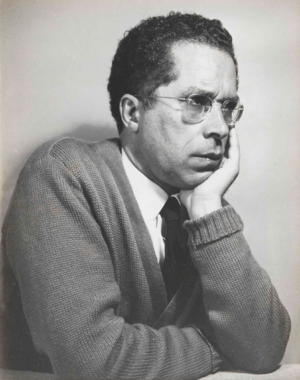Fernando Lopes-Graça facts for kids
Quick facts for kids
Fernando Lopes-Graça
|
|
|---|---|
 |
|
| Born | 17 December 1906 Tomar, Portugal
|
| Died | 27 November 1994 (aged 87) Parede, Portugal
|
| Signature | |
Fernando Lopes-Graça (born December 17, 1906, died November 27, 1994) was a famous Portuguese composer. He also conducted music and studied music history.
He was born in Tomar, Portugal. Lopes-Graça loved and studied Portuguese folk music. He continued the work of another music expert, Francisco de Lacerda. Lopes-Graça was part of the Portuguese Communist Party. He strongly disagreed with the government of Portugal at that time, called the Estado Novo, and its leader, António de Oliveira Salazar. He helped finish the Dicionário de Música (Dictionary of Music). This big project was started by his teacher, Tomás Borba. Fernando Lopes-Graça passed away in Parede, a town near Cascais.
Contents
A Look at His Life and Music
Fernando Lopes-Graça had a very interesting life. He faced challenges but always focused on his music. Here are some important moments from his life:
Early Life and Studies
- 1906: Fernando Lopes-Graça was born on December 17 in Tomar. He started learning to play the piano there.
- 1924: He became a student at the National Conservatory of Lisbon. This was a big step for his music education.
- 1927: He began studying with José Vianna da Motta. Vianna da Motta was a very skilled piano teacher.
- 1931: Lopes-Graça earned his degree in Composition. In the same year, he was arrested and sent away to Alpiarça for political reasons.
Challenges and Achievements
- 1934: He won a scholarship to study in France. However, he was not allowed to go because of his political views.
- 1937: Despite earlier problems, he managed to go to Paris. There, he studied composition and orchestration with Charles Koechlin.
- 1938: A group in Paris asked him to create a ballet called «La fiévre du temps». He also started arranging traditional Portuguese songs.
- 1940: He won a composition prize for his first Piano and Orchestra Concert. This was a major award for him.
- 1942: He won another prize for his work «História Trágico-Marítima». This piece was based on a poem by Miguel Torga.
- 1944: For the third time, he won the Composition Prize for his «Sinfonia». This showed his great talent.
Later Life and Important Works
- 1945: He joined the District Commission of the Movement of Democratic Unity. This group worked for democracy.
- 1949: He was asked to be a judge at the International Béla Bartók Festival in Budapest.
- 1952: He won another composition prize for his third Piano Sonata. This piece was for the pianist Hélène Boschi, who played it first in Paris in 1954.
- 1961: He published the first book of the Antologia de Música Regional Portuguesa. He worked on this with Michel Giacometti. He also began writing «In Memoriam Béla Bartók», a set of piano pieces. He finished this in 1975.
- 1969: A famous cellist, Mstislav Rostropovich, performed Lopes-Graça's Concerto da Camera.
- 1973: His collected writings, «Obras Literárias», started to be published. There were 18 books in total.
- 1974: After the Carnation Revolution, he became president of a committee. This committee worked to improve music education in Portugal.
- 1979: He composed a large piece called «Requiem pelas vítimas do fascismo em Portugal». This was a requiem for the victims of fascism in Portugal.
- 1981: The Hungarian government invited him to celebrate the 100th birthday of Béla Bartók.
- 1993: His complete piano sonatas and sonatinas were published. People also honored him for his 87th birthday.
- 1994: Fernando Lopes-Graça passed away at his home on November 27.
Special Honors
Fernando Lopes-Graça received important awards for his contributions. These awards are called national orders.
* Grand Officer of the Order of Saint James of the Sword (April 9, 1981): This is a high honor given for achievements in science, literature, and art.
* Grand Cross of the Order of Prince Henry the Navigator (February 2, 1987): This award recognizes people who have done great things for Portugal and its culture.
 | Delilah Pierce |
 | Gordon Parks |
 | Augusta Savage |
 | Charles Ethan Porter |



